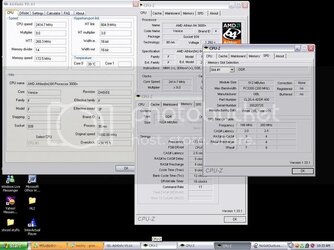Hi all, hope someone can help.
I was running an AMD 64 Venice 3000+ clocked at 2.2 GHZ on an ASROCK Dual VSTA motherboard. A friend basically overclocked it for me in the bios, but then I found out how to do it myself by watching him, and tried for a 2.4 overclock.
My processor multiplier was at x9, CPU FSB at 250 and Ram at 166 Mhz and pc stable. So I lowered the ram memory clock to 133Mhz and upped the cpu FSB to 275. No boot...and couldn't get into the bios, so I had to do a CMOS reset.
Right, since I've did the cmos reset, I've had problems.
1st Problem: Boot up (pre windows XP screen) is very slow....the bit where it shows the bios info and detects the drives, etc...really really slow. Even when I press the F11 to enter bios, this takes ages.
2nd Problem: My secondary HDD (IDE) is not being recognised at all. I've gone into bios and set everything how I remember, but it's still not recognising it at all.
3rd Problem: My CPU Multiplyer in bios says x9 (and I've set it manually back to 250 FSB and 166 Mhz and 1.45 voltage, but in CPU-z is it saying x5 multiplier, which I don't understand at all. It's x9 1800mhz in bios, very odd.
I had updated the bios about 2 months ago before doing this cmos reset, does that mean I have to reflash the bios after?
Appreciate any help,
Many thanks,
M
P.S.
Many of my settings in bios to do with memory and CPU are set to AUTO.
I'll list these, and would appreciate if someone can tell me whether I need to change anything:
CPU:
Spread Spectrum
CPU NB Link Speed
CPU NB Link Width
NB-SB Link Speed
NB-SB Link Width
Memoryall set at auto)
Cas Latency
TRAS
TRP
TRCD
TRC
MA Timing
Burst length is set to 4 (do I need to change this?)
Bank Interleaving - Auto
Memory Hole - Disabled
MA Timing - Auto
Gated Clock Function - Disable
DRAM Voltage Auto
ACPI - Suspend to Ram = Disabled
ACPI HPET Table - Disabled
I was running an AMD 64 Venice 3000+ clocked at 2.2 GHZ on an ASROCK Dual VSTA motherboard. A friend basically overclocked it for me in the bios, but then I found out how to do it myself by watching him, and tried for a 2.4 overclock.
My processor multiplier was at x9, CPU FSB at 250 and Ram at 166 Mhz and pc stable. So I lowered the ram memory clock to 133Mhz and upped the cpu FSB to 275. No boot...and couldn't get into the bios, so I had to do a CMOS reset.
Right, since I've did the cmos reset, I've had problems.
1st Problem: Boot up (pre windows XP screen) is very slow....the bit where it shows the bios info and detects the drives, etc...really really slow. Even when I press the F11 to enter bios, this takes ages.
2nd Problem: My secondary HDD (IDE) is not being recognised at all. I've gone into bios and set everything how I remember, but it's still not recognising it at all.
3rd Problem: My CPU Multiplyer in bios says x9 (and I've set it manually back to 250 FSB and 166 Mhz and 1.45 voltage, but in CPU-z is it saying x5 multiplier, which I don't understand at all. It's x9 1800mhz in bios, very odd.
I had updated the bios about 2 months ago before doing this cmos reset, does that mean I have to reflash the bios after?
Appreciate any help,
Many thanks,
M
P.S.
Many of my settings in bios to do with memory and CPU are set to AUTO.
I'll list these, and would appreciate if someone can tell me whether I need to change anything:
CPU:
Spread Spectrum
CPU NB Link Speed
CPU NB Link Width
NB-SB Link Speed
NB-SB Link Width
Memoryall set at auto)
Cas Latency
TRAS
TRP
TRCD
TRC
MA Timing
Burst length is set to 4 (do I need to change this?)
Bank Interleaving - Auto
Memory Hole - Disabled
MA Timing - Auto
Gated Clock Function - Disable
DRAM Voltage Auto
ACPI - Suspend to Ram = Disabled
ACPI HPET Table - Disabled

